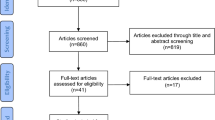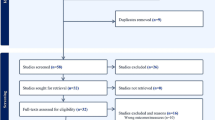Abstract
Purpose
Developmental dysplasia of the hip (DDH) is a leading cause of disability in childhood and early adult life. Clinical and sonographic screening programmes have been used to facilitate early detection but the effectiveness of both screening strategies is unproven. This article discusses the role for screening in DDH and provides an evidence-based review for early management of cases detected by such screening programmes.
Methods
We performed a literature review using the key words ‘hip dysplasia,’ ‘screening,’ ‘ultrasound,’ and ‘treatment.’
Results
The screening method of choice and its effectiveness in DDH still needs to be established although it seems essential that screening tests are performed by trained and competent examiners. There is no level 1 evidence to advise on the role of abduction splinting in DDH although clinicians feel strongly that hip instability does improve with such a treatment regime. The definition of what constitutes a pathological dysplasia and when this requires treatment is also poorly understood.
Conclusion
Further research needs to establish whether early splintage of clinically stable but sonographically dysplastic hips affects future risk of late-presenting dysplasia/dislocation and osteoarthritis. There is a need for high quality studies in the future if these questions are to be answered.




Similar content being viewed by others
References
Mackenzie IG, Wilson JG (1981) Problems encountered in the early diagnosis and management of congenital dislocation of the hip. J Bone Joint Surg Br 63:38–42
Dunn PM, Evans RE, Thearle MJ, Griffiths HE, Witherow PJ (1985) Congenital dislocation of the hip: early and late diagnosis and management compared. Arch Dis Child 60:407–414
Harris WH (1986) Etiology of osteoarthritis of the hip. Clin Orthop Relat Res 213:20–33
Furnes O, Lie SA, Espehaug B, Vollset SE, Engesaeter LB, Havelin LI (2001) Hip disease and the prognosis of total hip replacements. A review of 53,698 primary total hip replacements reported to the Norwegian Arthroplasty Register 1987–99. J Bone Joint Surg Br 83:579–86
Klisic PJ (1989) Congenital dislocation of the hip—a misleading term. J Bone Joint Surg Br 71:136
Angliss R, Fujii G, Pickvance E, Wainwright AM, Benson MKD (2005) Surgical treatment of late developmental displacement of the hip. J Bone Joint Surg Br 87:384–94
Standing Medical Advisory Committee (1969) Screening for the detection of congenital dislocation of the hip in infants. Dept of Health and Social Security, London
Sanghrajka AP, Murnaghan C, Shekkiris A, Hill RA, Roposch A, Eastwood DM. A consecutive case series review of open reductions for DDH over 5 years: what are the implications for current screening programmes using this proxy measure for failure. J Bone Joint Surg [Br] (suppl) 2009 in press
Godward S, Dezateux C (1998) Surgery for congenital dislocation of the hip in the UK as a measure of outcome of screening. Lancet 351:1149–1152
Jones D (1998) Neonatal detection of development dysplasia of the hip. J Bone Joint Surg Br 80:943–945
Kim HT, Wenger DR (1997) Location of acetabular deficiency and associated hip dislocation in neuromuscular hip dysplasia: three dimensional computed topographic analysis. J Paediatr Orthop 17:143–151
Eastwood DM (2003) Neonatal hip screening. Lancet 361:595–597
Walton MJ, Isaacson Z, McMillan D, Hawkes R, Atherton WG (2010) The success of management with the Pavlik harness for developmental dysplasia of the hip using a United Kingdom screening programme and ultrasound-guided supervision. J Bone Joint Surg Br 92:1013–16
Van der Sluijs JA, De Gier L, Verbeke JI et al (2009) Prolonged treatment with the Pavlik harness in infants with developmental dysplasia of the hip. J Bone Joint Surg Br 91:1090–1093
Atalar H, Sayli U, Yavuz OY, Uras I, Dogruel H (2007) Indicators of successful use of the Pavlik harness in infants with developmental dysplasia of the hip. Int Orthop 31:145–150
Viere RG, Birch JG, Herring JA, Roach JW, Johnston CE (1990) Use of the Pavlik harness in congenital dislocation of the hip. An analysis of failures of treatment. J Bone Joint Surg Am 72:238–244
Standing Medical Advisory Committee and Standing Nursing and Midwifery Advisory committee (1986) Screening for the detection of congenital dislocation of the hip. Dept of Health and Social Security, London
Ortolani M (1976) The classic. Congenital hip dysplasia in the light of early and very early diagnosis. Clin Orthop Relat Res 119:6–10
Barlow TG (1962) Early diagnosis and treatment of congenital dislocation of the hip. J Bone Joint Surg Br 44:292–301
Jones D (1977) An assessment of the value of examination of the hip in the newborn. J Bone Joint Surg Br 59:318–22
Macnicol MF (1990) Results of a 25-year screening programme for neonatal hip instability. J Bone Joint Surg Br 72:1057–1060
Jari S, Paton RW, Srinivasan MS (2002) Unilateral limitation of abduction of the hip a valuable clinical sign for DDH? J Bone Joint Surg Br 84:104–107
Ryder CT, Mellin WG, Caffey J (1962) The infant’s hip—normal or dysplastic? Clin Orthop Relat Res 22:7–19
Visser F, Sprij AJ, Bos CF (2009) Comment on: clinical examination versus ultrasonography in detecting developmental dysplasia of the hip. Int Orthop 33:883–884
Sanfridson J, Redlund-Johnell I, Busfield PI (1967) Dislocatable hip and dislocated hip in the newborn infant. BMJ 4:377–381
Sewell MD, Rosendahl K, Eastwood DM (2009) Developmental dysplasia of the hip. BMJ 339:b4454
National Screening Committee (2011) NHS Newborn & Infant Physical Examination Screening Programme. http://www.screening.nhs.uk/newborninfantphysical-england. Accessed 5 April 2011
Graf R (1980) The diagnosis of congenital hip-joint dislocation by the ultrasonic Combound treatment. Arch Orthop Trauma Surg 97:117–133
Rosendahl K, Markestad T, Lie RT (1994) Ultrasound screening for developmental dysplasia of the hip in the neonate: the effect on treatment rate and prevalence of late cases. Pediatrics 94:47–52
Harcke HT, Clarke NM, Lee MS et al (1984) Examination of the infant hip with real-time ultrasonography. J Ultrasound Med 3:131–137
Dias JJ, Thomas IH, Lamont AC et al (1993) The reliability of ultrasonographic assessment of neonatal hips. J Bone Joint Surg Br 75:479–482
Morin C, Harcke HT, MacEwen GD (1985) The infant hip: real-time US assessment of acetabular development. Radiology 157:673–677
Holen KJ, Tegnander A, Eik-Nes SH, Terjesen T (1999) The use of ultrasound in determining the initiation of treatment in instability of the hip in neonates. J Bone Joint Surg Br 81:846–851
Holen KH, Tegnander A, Bredland T et al (2002) Universal or selective screening of the neonatal hip using ultrasound? J Bone Joint Surg Br 84-B:886–890
Marks DS, Clegg J, Al-Chalabi AN (1994) Routine ultrasound screening for neonatal hip instability. Can it abolish late-presenting congenital dislocation of the hip. J Bone Joint Surg Br 76-B:534–538
Rosendahl K, Markestad T, Lie RT (1992) Ultrasound in the early diagnosis of congenital dislocation of the hip: the significance of hip stability versus acetabular morphology. Pediatr Radiol 22:430–433
Rosenberg N, Bialik V, Norman D, Blazer S (1998) The importance of combined clinical and sonographic examination of instability of the neonatal hip. Int Orthop 22(3):185–188
Dogruel H, Atalar H, Yavuz OY, Sayli U (2008) Clinical examination versus ultrasonography in detecting developmental dysplasia of the hip. Int Orthop 32:415–419
Paton RW, Sriivasan MS, Shah B et al (1999) Ultrasound screening for hips at risk in developmental dysplasia of the hip: is it worth it? J Bone Joint Surg Br 81:255–258
Paton RW (2009) Development dysplasia of the hip: ultrasound screening and treatment. How are they related? Hip Int 19:S3–8
Ihme N, Altenhofen L, von Kries R, Niethard FU (2008) Hip ultrasound screening in Germany. Results and comparison with other screening procedures. Orthopade 37(541–6):548–549
Von Kries R, Ihme N, Oberle D, Lorani A, Stark R, Altenhofen L, Niethard FU (2003) Effect of ultrasound screening on the rate of first operative procedure for developmental hip dysplasia in Germany. Lancet 362:1883–1887
Clegg J, Bache CE, Raut VV (1999) Financial justification for routine ultrasound screening of the neonatal hip. J Bone Joint Surg Br 81:852–857
Gray A, Elbourne D, Dezateux C et al (2005) Economic evaluation of ultrasonography in the diagnosis and management of developmental hip dysplasia in the UK and Ireland. J Bone Joint Surg Am 87:2472–2479
US Preventative Services Task Force (2006) Screening for developmental dysplasia of the hip: recommendation statement. Pediatrics 117:898–902
Tegnander A, Terjesen T, Bredland T, Holen KJ (1994) Incidence of late-diagnosed hip dysplasia after different screening methods in newborns. J Paediatr Orthop B 3:86–88
Cashman JP, Round J, Taylor G, Clarke NM (2002) The natural history of developmental dysplasia of the hip after early supervised treatment in the Pavlik harness. A prospective, longitudinal follow-up. J Bone Joint Surg Br 84:418–425
Bradley J, Wetherill M, Benson MK (1987) Splintage for congenital dislocation of the hip. Is it safe and reliable? J Bone Joint Surg Br 69:257–263
Johnson AH, Aadalen RJ, Eilers VE, Winter RB (1981) Treatment of congenital hip dislocation and dysplasia with the Pavlik harness. Clin Orthop Relat Res 155:25–29
Fujioka F, Terayama K, Sugimoto N, Tanikawa H (1995) Long-term results of congenital dislocation of the hip treated with the Pavlik harness. J Paediatr Orthop 15:747–752
Mubarak S, Garfin S, Vance R et al (1981) Pitfalls in the use of the Pavlik harness for treatment of congenital dysplasia, subluxation, and dislocation of the hip. J Bone Joint Surg Am 63:1239–1248
Rampal V, Sabourin M, Erdeneshoo E et al (2008) Closed reduction with traction for developmental dysplasia of the hip in children aged between one and five years. J Bone Joint Surg Br 90:858–863
Morcuende JA, Meyer MD, Dolan LA, Weinstein SL (1997) Long-term outcome after open reduction through an anteromedial approach for congenital dislocation of the hip. J Bone Joint Surg Am 79:810–817
Roposch A, Stohr KK, Dobson M (2009) The effect of the femoral head ossific nucleus in the treatment of developmental dysplasia of the hip. A meta-analysis. J Bone Joint Surg Am 91:911–918
Spence G, Hocking R, Wedge JH, Roposch A (2009) Effect of innominate and femoral varus derotation osteotomy on acetabular development in developmental dysplasia of the hip. J Bone Joint Surg Am 91:2622–2636
Clarke NM, Jowett AJ, Parker L (2005) The surgical treatment of established congenital dislocation of the hip: results of surgery after planned delayed intervention following appearance of the capital femoral ossific nucleus. J Pediatr Orthop 25:434–439
Acknowledgements
We acknowledge the British Medical Journal for allowing us to modify tables and figures for use in this article.
Author information
Authors and Affiliations
Corresponding author
Rights and permissions
About this article
Cite this article
Sewell, M.D., Eastwood, D.M. Screening and treatment in developmental dysplasia of the hip—where do we go from here?. International Orthopaedics (SICOT) 35, 1359–1367 (2011). https://doi.org/10.1007/s00264-011-1257-z
Received:
Revised:
Accepted:
Published:
Issue Date:
DOI: https://doi.org/10.1007/s00264-011-1257-z




